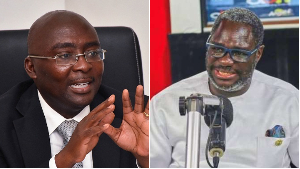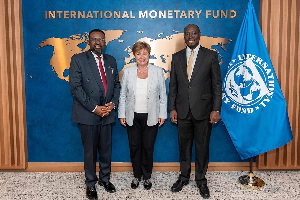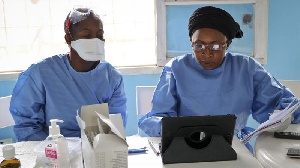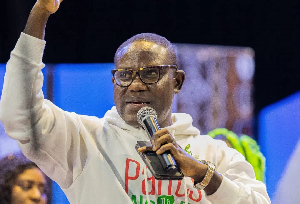“We must complain. Yes, plain, blunt complaint, ceaseless agitation, unfailing exposure of dishonesty and wrong—this is the ancient, unerring way to liberty and we must follow it” (W.E.B. Du Bois).
AN IMPERATIVE NEED FOR TEACHABLE CLOSURES IN INSTITUTIONAL CORRUPTION CASES
“The wise create proverbs for fools to learn, not to repeat” (An African proverb).
Then also if we should remind our readers again, in the article “Bugri Naabu: The Only Thing I Fear is the English Language” published on Ghana and elsewhere on December 4, 2014, we suggested in no uncertain terms that a story half told deserves a measure of uncompromising finality, a moral and political denouement in the political theatre.
We still maintain this stance.
Having said that, we should also point out we are yet to know in any degree of appreciable detail whether the National Democratic Congress (NDC) or the New Patriotic Party (NPP) has any intentions of pursuing these scandalous allegations of malfeasance to their logical conclusion.
Our central argument is that pursuing this matter to its logical conclusion without the emotional taint of political bias in a competent jurisdiction, for instance, is one surest way to strengthen our institutions and furthermore, perhaps most significantly, to stamp or drum the fear of institutional deterrence and of corrective justice into unscrupulous public officials.
After all, there is nothing more important for us at this point than seeing our institutions work.
Therefore, it is high time we as a nation moved past this spectacular familiarity of lip service which our scheming, unproductive politicians pay to strengthening public institutions even as the moral qualities of men and women representing these institutions go into steep decline.
Likewise, we have to move past the erroneous impression that the astonishing scale of institutional corruption in Ghana somehow starts and ends with the investigational lens of Anas Aremeyaw Anas’ camera—far from it.
Rather, institutional corruption has all the debilitating symptomatology of terminal cancer after having metastasized in the Ghanaian body politic throughout the years.
There is a haunting schadenfreude that accompanies our kleptomaniacal democracy in that this kleptomaniacal democracy feeds on the blood of institutional corruption while the former, in turn, feeds on the former.
This idea which closely resembles the concept of reciprocal causation has everything to do with divorcing our kleptomaniacal democracy from institutional corruption.
Arrogance of power also supports this strong correlation.
Ghana therefore sits on a nuclear bomb of institutional corruption—that is.
In one sense therefore, attempts to dissolve the thick concrete wall between our kleptomaniacal democracy and institutional corruption remains a forbidding challenge.
In another sense the NPP and NDC which have no shame and have strategically resolved into apocalyptic authors of political wickedness in high places, have also turned themselves into vindictive masquerades of grudging viragos behind a pastiche of moral translucence where they have comfortably assumed undue apostleship of the moral high ground in matters of public and political morality.
Politicians are wont to make bold sloganeering and electioneering assertions about policy and institutional reforms for the general benefit of society, yet once they officially assume the mantle of leadership they quickly dispense with these convenient assertions for lack of conviction of purpose and enforcement.
OTHER CRITICAL OBSERVATIONS
“Ambush in the Night” (Bob Marley):
“Trying to belittle our
“Integrity now
“They say what we know
“Is just what they teach us
“And we're so ignorant…
“Well, what we know
“Is not what they tell us:
“We're not ignorant, I mean it…
Ghanaian politicians always claim there is no money in the national purse to underwrite better public services or even expand and refurbish existing ones; to turn under-tree schools into habitable ones fully furnished with modern conveniences from basic teaching materials to computers; to provide for universal toilet facilities so as to eliminate or curtail open defecation; to remunerate state employees; to construct public infrastructure and so on, yet out of the blue flows unstinted money for vote-buying; bribing officials of the Electoral Commission (EC) and television and radio owners and presenters/hosts, judges, the grassroots of political parties, serial callers…
At the end of the day, institutional corruption persists because we have developed an unlimited capacity for it. However, unlike the infamous corruptocrat Kufuor, the late Mills refused to pursue the murderous political criminals in the ethnocentric NPP, because Nigerian conman T.B. Joshua prevailed on him to resist public pressure to do just that, for the sake of national peace.
As expected, Mills’ political pathos would directly play into the leprous hands of our entrenched duopolistic corruptocracy.
On the other hand, it will be politically objectionable if the Flagstaff House under Akufo-Addo’s watch dare designate Owusu Bempah as one of its unofficial policy advisors, although we will also concede that to be a decisional prerogative only the former can exercise as the popular embodiment of the executive institution.
The Flagstaff House, a den of murderous political thieves and criminals and ignoble hypocritical robots, should not be turned into a lounge for sycophantic, scheming charlatans and shady characters who are wont to constitute themselves into public nuisance, for we have come a long way and therefore we should all expect to know better on the basis of this eye-opening knowledge.
The Flagstaff House is supposed to a rational, pragmatic laboratory for patriotic technocrats who truly understand the intricacies of nation-building, economic and sustainable development, comparative advantage and more generally, development economics.
Perhaps, most significantly, these miscalculations put the kibosh on the entire enterprise of understanding it [institutional corruption]. Even so, egregious political miscalculations such as having unpatriotic, irrational, un-pragmatic and non-technocratic political theologians serve in unofficial capacities as policy advisors may have a detrimental impact on the country’s development economics.
We may have witnessed a policy instantiation of this phenomenon in the Mills administration as well as in the Rawlings administration, the latter of which the policy manipulations of Rev. Dr. Vincent Kwabena Damuah, founding overseer of the Africana Mission, immediately come to mind.
In fact, and if we may also add, such miscalculations have rather tended to undermine or frustrate serious longitudinal investigations into the winding nature of institutional corruption.
This is why charlatans such as Owusu Bempah must be made to stay as far away from the Flagstaff House as is humanly possible, that is, he must be kept at arm’s length from the office of the executive president as the rational pragmatism of politics, statecraft and strategic policy formulations do not make for the charitable provinces of dubious, weak-minded political theologians and sticky, divisive opportunists, and certainly a place not for apocalyptic dreamers and sensational prophetic nation-wreckers and grudging millennialist sermonizers.
Politics is a serious business meant for strong minds although not the kind of minds we see in our kleptomaniacal idiocracy.
That one is all too clear.
The other fact is that the leaderships of the NPP and the NDC liberally promote idiocracy and corruptocracy because, as we pointed out elsewhere, both systems make Ghana’s kleptomaniacal democracy possible and hence the lack of moral seriousness and political will on the part of the ruling class to fight institutional corruption.
Instead of investigating political criminals, prosecuting them and sending them to prison if and when found guilty, they are transferred from one department to another and even promoted in some cases on the basis of political expedience and patronage. The end result is a revolving-door of impunity and recidivism.
Even when or where a corruption case goes to the office of the presidency for official review, it is converted into a parody of justice.
White papers issued on important cases of institutional corruption and forwarded to the executive presidency for redress is simply reduced to partisan dumpsites of toilet rolls—paper tigers, or to the kind of hyped partisan politics and shameful earsplitting rhetoric of political equalization Ghanaians are generally known for.
Nothing absolutely gets—literally—done by way of the fight against institutional corruption. And so the partisan business of public corruption continues unabated—as usual.
These paper tigers conflate positive economics with normative judgments, for instance.
This is the more reason why empanelling an independent commission may be in the best of the nation since it is our opinion that it may do a better job of effectively tracking the epidemiology of institutional corruption throughout the Fourth Republic than, say, either the NPP or the NDC.
Moreover, independence and political influence are synonymous in Ghana’s kleptomaniacal democracy.
How can one notorious criminal political gang investigate another notorious criminal political gang, let alone exercise the adjudicative powers of prosecution and sentencing? How can one criminal political gang simultaneously take on the sacred roles of judgeship, prosecutorship, and wardenship?
Sometimes, if not all the time, we get the eerie feeling that a vigorous crusade mounted against the muscular scaffolding of institutional corruption will bring down Ghana’s much-vaunted kleptomaniacal democracy, hence the political and moral nonchalance in the face of the wanton dissipation of the public purse!
In the end Ghanaians should hold their leaders to their phantom, grandiose electioneering and sloganeering promises, for instance from passing the Freedom of Information Bill (FOIB) to creating a special office for an independent prosecutor. Such are basic demands. Need we say more?
We shall return with Part 4.
REFERNCES
“The Best: 72+ African Wise Proverbs And Inspiring Quotes.” Retrieved from http://afritorial.com/the-best-72-african-wise-proverbs/
Opinions of Thursday, 29 December 2016
Columnist: Kwarteng, Francis














